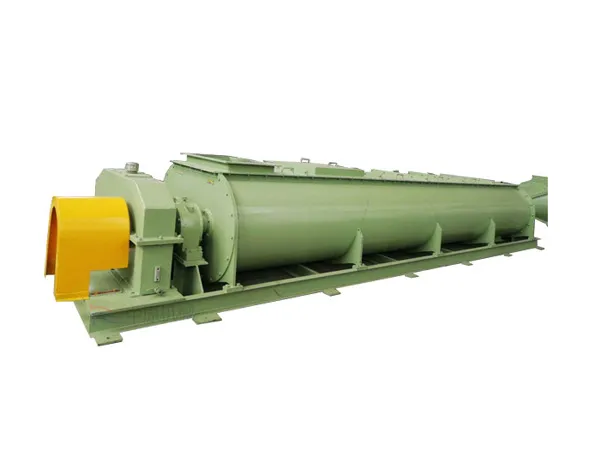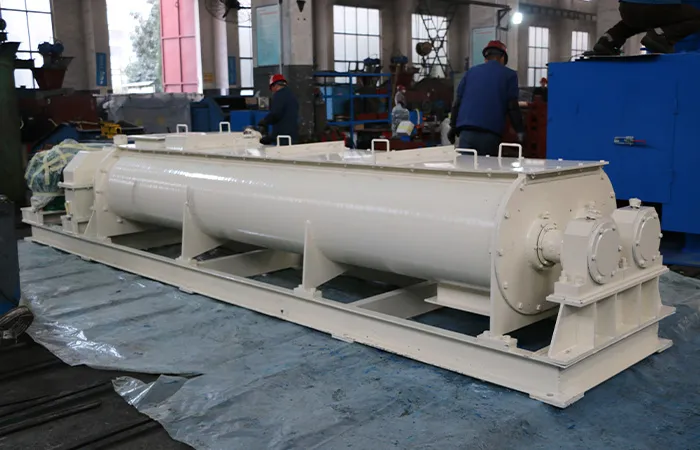A double shaft mixer, often called a twin-shaft mixer or pugmill, is a high-intensity, industrial mixing machine designed to blend a wide variety of materials quickly and homogeneously.
Its core feature is the presence of two parallel, counter-rotating shafts equipped with multiple paddles, blades, or arms. These shafts are housed within a W-shaped or U-shaped trough. This design creates a powerful and efficient mixing action that is ideal for demanding applications, especially those involving aggregates, sludges, powders, and pastes.Maintaining a double shaft mixer is crucial for its longevity, efficiency, and safe operation.
Double Shaft Mixer Maintenance Tips

I. Daily/Per Shift Maintenance:
Cleaning is Paramount:
Thorough Washout: After every use, especially with concrete or sticky materials, thoroughly clean the mixer. Use water, and for stubborn buildup, consider adding gravel to the water and running the mixer for 5-30 minutes.
Remove Residue: Scrape off any remaining material from the interior, especially the mixing arms, blades, and shaft. Hardened concrete or material buildup reduces mixing efficiency and can damage components.
Discharge Door: Clean deposits around the discharge door to ensure smooth opening and closing.
Non-Wetted Parts: Be careful when cleaning non-wetted components to avoid damage from liquids.
Lubrication Checks:
Central Lubrication System: Ensure the central lubrication pump is working properly. Check for any leaks in connection points and refill the lubricant if necessary.
Shaft End Seal: This is a critical area. Check the lubricating oil pump for normal oiling daily. Ensure there’s oil in the oil pump oil cup and the pump’s cartridge is normal. If there’s an issue, stop immediately and troubleshoot. If manual oiling is needed, do it every 30 minutes to keep the shaft end sufficiently lubricated.
Other Lubrication Points: Check other lubrication points like spindle bearings, discharge door bearings, motor bottom plate rotating shaft, and hydraulic cylinder rotating shaft.
Visual Inspection:
Leaks: Look for any oil, grease, or other fluid leaks, which could indicate seal or gasket problems.
Unusual Noises/Vibrations: Listen for any strange sounds or vibrations, which can be early indicators of a problem. Stop operation immediately if detected.
Loose Bolts/Connections: Check for any loose bolts on blades, stirring arms, and lining plates, and tighten them.
Wear and Tear: Quickly inspect for any obvious signs of damage, cracks, or corrosion on external components like the motor, drive shafts, and blades.
Control Panel: Check the alarm status on the control panel.
II. Weekly Maintenance:
Lubrication:
Check the oil level of the reducer and hydraulic pump.
Belt Tension:
Check and adjust the tension of the driving belt using the belt stretching unit. Ensure proper tension to avoid premature wear or slippage.
Wear Parts:
Visually inspect seals, bearings, and couplings for wear or damage. Replace any seals that show cracks or damage.
Check the alignment of mixing blades and adjust as needed.
Material Buildup:
Perform a longer, more thorough cleaning with water and rock to remove any deeper buildup.

III. Monthly Maintenance:
Gearbox: Check the oil level in the gearbox.
…
More detailed information about the maintenance tips of double shaft mixer can be clicked to visit:https://www.zymining.com/en/a/news/double-shaft-mixer-maintenance-tips.html



